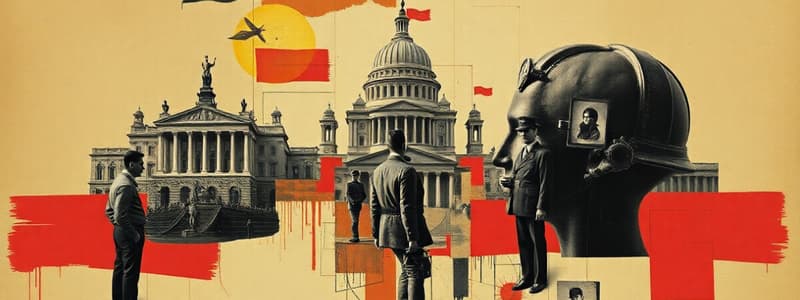Podcast
Questions and Answers
Which model primarily promotes local governance by dividing power?
Which model primarily promotes local governance by dividing power?
- Unitary State
- Federalism (correct)
- Totalitarianism
- Authoritarianism
What political theory emphasizes the necessity of a strong central authority?
What political theory emphasizes the necessity of a strong central authority?
- Realism
- Social Contract Theory (correct)
- Lockean Liberalism
- Transformationalism
Which type of governance model seeks to control all aspects of both public and private life?
Which type of governance model seeks to control all aspects of both public and private life?
- Democracy
- Totalitarianism (correct)
- Federalism
- Unitary State
Which theorist is known for advocating the idea of philosopher-kings?
Which theorist is known for advocating the idea of philosopher-kings?
In which international relations theory is cooperation among states emphasized?
In which international relations theory is cooperation among states emphasized?
What concept addresses the idea of fairness and moral rightness in society?
What concept addresses the idea of fairness and moral rightness in society?
Which governance model limits political freedoms through centralized control?
Which governance model limits political freedoms through centralized control?
What is a key feature of constructivism in international relations?
What is a key feature of constructivism in international relations?
Flashcards are hidden until you start studying
Study Notes
Governance Models
- Definition: Structures and processes through which authority and decision-making occur in a society.
- Types of Governance Models:
- Democracy: Power rests with the people; includes direct and representative forms.
- Authoritarianism: Centralized control by a single authority or party; limits political freedoms.
- Totalitarianism: Extreme form of authoritarianism; seeks to control all aspects of public and private life.
- Federalism: Power is divided between central and regional authorities; promotes local governance.
- Unitary State: Centralized government with most authority held by the national government.
- Emerging Models:
- Participatory Governance: Involves citizens actively in decision-making processes.
- E-Governance: Use of digital tools to enhance public services and citizen engagement.
Political Theory
- Definition: Study of political ideas, concepts, and philosophies that influence governance.
- Key Concepts:
- Justice: Theories of fairness and moral rightness in society (e.g., Rawls’ Theory of Justice).
- Power: Examination of authority, legitimacy, and influence over others.
- Sovereignty: The authority of a state to govern itself without external interference.
- Rights: Discussion on civil, political, and human rights and their implications.
- Major Theorists:
- Plato: Advocated for philosopher-kings and the ideal state.
- Aristotle: Introduced empirical observation; focused on the study of various political systems.
- Hobbes: Proposed the social contract and the necessity of a strong central authority.
- Locke: Emphasized natural rights and government accountability.
- Marx: Analyzed class struggle and the impacts of capitalism on society.
International Relations
- Definition: Study of interactions between nation-states and non-state actors on a global scale.
- Key Theories:
- Realism: Focuses on state power and national interest; views international relations as a struggle for power.
- Liberalism: Emphasizes cooperation, international institutions, and interdependence among states.
- Constructivism: Highlights the role of ideas, beliefs, and identities in shaping international relations.
- Important Concepts:
- Sovereignty: Principle of political independence and territorial integrity of states.
- Globalization: Increasing interconnectedness of economies, cultures, and political systems.
- Security Studies: Focuses on issues related to national security and military strategy.
- Key Actors:
- States: Primary actors in international relations, pursuing national interests.
- International Organizations: Entities like the UN and NATO that facilitate cooperation.
- Non-Governmental Organizations (NGOs): Influence policies and humanitarian efforts.
- Multinational Corporations (MNCs): Impact economic policies and international trade.
Governance Models
- Definition: Frameworks determining how authority and decision-making are structured in societies.
- Democracy: Power lies with the populace, encompassing direct forms (citizen voting) and representative forms (elected officials).
- Authoritarianism: Characterized by a concentration of power in a single authority or party, often restricting political freedoms and civil liberties.
- Totalitarianism: A more severe version of authoritarianism, aiming to control every facet of public and private life.
- Federalism: Division of power between central and regional governing bodies, encouraging localized decision-making and governance.
- Unitary State: Centralized governance model where the national government holds the majority of decision-making authority.
- Emerging Models:
- Participatory Governance: Engages citizens in the decision-making process, enhancing democratic practices.
- E-Governance: Integration of digital technology in public service delivery and citizen engagement, promoting transparency and efficiency.
Political Theory
- Definition: Explore the influence of political ideas, concepts, and philosophies on governance structures.
- Key Concepts:
- Justice: The study of fairness and morality; notable works include Rawls’ Theory of Justice addressing societal equity.
- Power: The assessment of authority, legitimacy, and the influence mechanisms exercised over individuals and groups.
- Sovereignty: Recognition of a state's right to govern independently, free from external interference.
- Rights: Examination of civil, political, and human rights including their roles and consequences in society.
- Major Theorists:
- Plato: Proposed the concept of philosopher-kings to achieve an ideal society.
- Aristotle: Pioneered empirical methods, assessing diverse political systems and governance forms.
- Hobbes: Introduced the social contract idea, advocating for strong centralized power to avoid chaos.
- Locke: Highlighted natural rights and the importance of government accountability to the governed.
- Marx: Focused on class struggles, critiquing capitalism and its socio-economic impacts.
International Relations
- Definition: Investigation of interactions between nation-states and non-state actors at the global level.
- Key Theories:
- Realism: Prioritizes state power and national interests, viewing international relations as a power struggle.
- Liberalism: Advocates for cooperation and collective action through international institutions, emphasizing state interdependence.
- Constructivism: Stresses the influence of ideas, beliefs, and identities in shaping state behavior and international phenomena.
- Important Concepts:
- Sovereignty: Ensures the political independence and integrity of states, a fundamental principle in international relations.
- Globalization: Refers to the increasing interconnectedness across economies, cultures, and political frameworks worldwide.
- Security Studies: Examines issues related to national security, military strategies, and threats to sovereignty.
- Key Actors:
- States: Central participants in international relations, each pursuing its national objectives.
- International Organizations: Bodies like the United Nations and NATO facilitating global cooperation and conflict resolution.
- Non-Governmental Organizations (NGOs): Influence advocacy, policy-making, and humanitarian activities on international platforms.
- Multinational Corporations (MNCs): Major economic players that affect global trade policies and international economic dynamics.
Studying That Suits You
Use AI to generate personalized quizzes and flashcards to suit your learning preferences.




